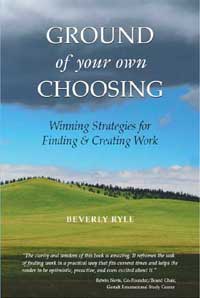Tag
Worry—Again!
 I usually begin thinking about a column a few weeks before I sit down to write it, but the month of January flew by so quickly and the approach of the deadline for this month threw me into a panic.
I usually begin thinking about a column a few weeks before I sit down to write it, but the month of January flew by so quickly and the approach of the deadline for this month threw me into a panic.
How could I possibly attend to the client work on my calendar, prepare for a strategic planning summit a week from now, and write a newsletter?
The more I stared at the calendar, trying to find open space, the more inaccessible a topic seemed. I not only couldn’t think of anything to write about—I also couldn’t remember anything I’d written in the eight years I’ve been producing this newsletter!
Fear Funk

Sometimes it comes on gradually—the pressure you feel to find work, get your business in the black again, or restore stability to your financial future accumulates, causing sleepless nights or mornings when you sit at your desk not knowing what to do next.
Or there may be a trigger—one rejection too many, a bill you can't pay, or a depressing headline saps your belief in yourself and better days ahead, and you have that sinking sensation of fear taking you over for a few days or a week or longer.
Fear is a natural reaction to change, and you can expect it to be particularly active when your work-life, that part of your existence that provides sustenance, purpose and identity, has been shaken like a snow globe.
Staying Home
 A 2005 article in the London Evening Standard about overwhelmed working women advised them “not to struggle into work when ill but to stay at home and rest.” Likewise, the November 2009 issue of Working Women magazine cautioned readers against “dragging [their] fever-ridden [bodies] into the office.”
A 2005 article in the London Evening Standard about overwhelmed working women advised them “not to struggle into work when ill but to stay at home and rest.” Likewise, the November 2009 issue of Working Women magazine cautioned readers against “dragging [their] fever-ridden [bodies] into the office.”
Under ordinary circumstances, this would be simply a matter of common sense, but the economic slowdown we are experiencing has eroded our sense of work security and had the effect of making people fearful that their absence from work, even for a day or two, could have disastrous consequences. In a new context, this simple advice deserves a closer look.
In Crazy Busy, author and physician Edward Hallowell talks about having to go to work regardless of your physical condition as if it were something that belongs to the past, like the experience of the lower classes as described in Dickens’s novels. But is it?
Reassurance
 I usually look forward to business slowing down a bit in the summer, but this year, when my workload started to slacken, I caught myself starting to worry (probably because I wrote a column about it last month), thinking "What if—?" You know the rest! Right?
I usually look forward to business slowing down a bit in the summer, but this year, when my workload started to slacken, I caught myself starting to worry (probably because I wrote a column about it last month), thinking "What if—?" You know the rest! Right?
So I stepped into my husband's office and asked him for reassurance.
I didn't ask for a review of our financial status, or go into a soliloquy on all the reasons I thought the sky was falling as a way of circuitously trying to get him to convince me I was wrong (a technique I learned from my grandmother).
I simply asked him to tell me we were going to be OK. He did, and I went back into my office and had a productive afternoon.
This incident prompted me to think about how important it is to give and receive reassurance, especially right now when so many of us are under the stress of change and economic pressures.
Worry
Months ago, in the early stages of the economic downturn we're in now, I read a report in the New York Times that over half of working adults were worried about losing their job. My instincts tell me that this proportion has significantly risen since then. Let's face it—it's hard to rest easy when giants like GM are tumbling.
Since there is so much anxiety these days, I decided to take a closer look at it by reading Edward Hallowell's book, Worry.
According to Hallowell, worry actually has a valuable purpose. It's there to alert us to danger and prompt us to take protective action. Unfortunately, being human, we have a tendency to let our imagination run away with us and create perceptions of danger that are not real.
Which is why Samuel Johnson, a consummate worrier himself, said back in the 18th century, “Worry is the disease of the imagination.”
Dealing With Someone Else’s Job Loss
Judging from conversations I’m having these days with loved ones of those who have suddenly found themselves unemployed, or fear that they might be, there are a lot of people entering 2009 with concerns about another person’s employment status.
While we all recognize that it’s difficult being the one out there looking for work, we sometimes forget that it is also emotionally challenging for the spouse or the parent of that person.
You want very much to be supportive, to be wholeheartedly there for your husband, wife or child, but at the same time you are grappling with your own fears. Keeping your anxiety from overcoming the goal of providing support and encouragement to the work-seeker is a tricky business.
The Mayflower Leaving
 I've been thinking a lot about the Pilgrims lately, and not because as I write this it's a few days after Thanksgiving. Thanksgiving represents abundance, yet my thoughts concerning these first New England immigrants have been more about scarcity and how they dealt with it.
I've been thinking a lot about the Pilgrims lately, and not because as I write this it's a few days after Thanksgiving. Thanksgiving represents abundance, yet my thoughts concerning these first New England immigrants have been more about scarcity and how they dealt with it.
Coming to the New World was always a risky venture for them, and to make matters worse, when they arrived, they were not where they expected to be, the mouth of the Hudson River, where the weather was more temperate and soil more fertile.
You need only step into Provincetown Harbor in November, where they waded ashore for the first time, or stand for few moments in the winter wind off Plymouth Bay to imagine their dismay at the miscalculation that had brought them there.
Despite the fact that he had misgivings about the Pilgrims at first (he thought they were kooks), Christopher Jones, skipper of the Mayflower, had come to respect his pious passengers, so much so that he delayed his departure as long as he could.
But on April 5, 1621, almost six months after it arrived, the Mayflower sailed for England, There is a local cafe which has a painting of this moment hanging on the wall. It shows the citizens of the newly founded colony of Plymouth watching the Mayflower leave, taking with it any possibility of going back to the life they had previously known. From now on, they would be alone in a world full of uncertainty and peril, which also offered, if they persevered, the possibility of creating a better life.
Protective Strategies
In response to growing concerns about financial survival, the news media is full of information about ways to save money, conserve energy, etc., but very little is being said about people's biggest worry—secure employment!
Work, either through job-employment or self-employment, is the levee that protects us, and as long as it holds, we can weather the storm of uncertainty. But what if the traditional approaches to sustaining and finding work can't stand up to the current surge of events?
Hard times require more vigilance in taking care of your professional future—or as I said to one of my clients recently, "Being wishy-washy or needy isn't going to cut it!"
A Mother’s Day Message
My husband and I were taking Amtrak to Virginia, and in Trenton, a stylishly dressed mature woman boarded the train and took the seat behind us. She dozed until Wilmington in an erect posture with her back against the window. Then she awoke and called her son.
I know this because it's impossible not to overhear a cell phone conversation on a train, and because her opening remark, intended to capture her son's full attention, also got mine.
"God invented cell phones," she said, "so that mothers could call their sons to see if they will be picking them up at the station or if they will be left on the curb like a discarded piece of luggage."
I immediately envisioned a middle-aged attorney or executive cringing in his office. Now I know this was speculation, but given the birthday gift bag on the seat beside her, and her highly organized manner, it was hard to believe that there had been no prior conversations about her arrival and the logistics connected with it. Yet the intensity of her tone made it clear she did not trust the arrangements would be carried out.






